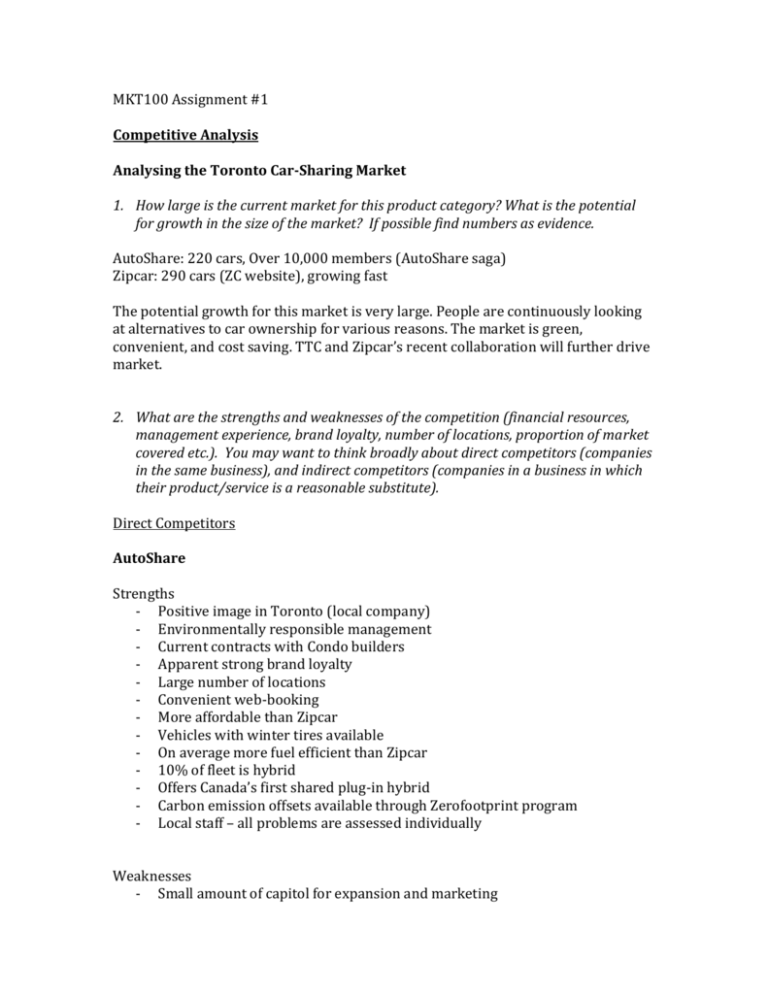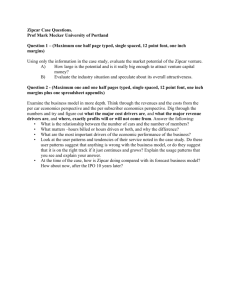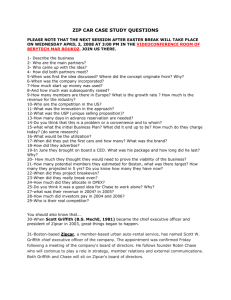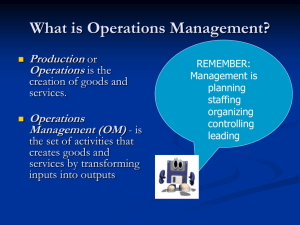MKT100 Assignment 1
advertisement

MKT100 Assignment #1 Competitive Analysis Analysing the Toronto Car-Sharing Market 1. How large is the current market for this product category? What is the potential for growth in the size of the market? If possible find numbers as evidence. AutoShare: 220 cars, Over 10,000 members (AutoShare saga) Zipcar: 290 cars (ZC website), growing fast The potential growth for this market is very large. People are continuously looking at alternatives to car ownership for various reasons. The market is green, convenient, and cost saving. TTC and Zipcar’s recent collaboration will further drive market. 2. What are the strengths and weaknesses of the competition (financial resources, management experience, brand loyalty, number of locations, proportion of market covered etc.). You may want to think broadly about direct competitors (companies in the same business), and indirect competitors (companies in a business in which their product/service is a reasonable substitute). Direct Competitors AutoShare Strengths - Positive image in Toronto (local company) - Environmentally responsible management - Current contracts with Condo builders - Apparent strong brand loyalty - Large number of locations - Convenient web-booking - More affordable than Zipcar - Vehicles with winter tires available - On average more fuel efficient than Zipcar - 10% of fleet is hybrid - Offers Canada’s first shared plug-in hybrid - Carbon emission offsets available through Zerofootprint program - Local staff – all problems are assessed individually Weaknesses - Small amount of capitol for expansion and marketing - Cars up to six years old Small company 38% of market and falling Paying off debts Zipcar Strengths - Largest car-sharing company in North America - 75% of North American market - Leading innovator in new technology for car-sharing - Large capital from investment - 62% of Toronto market and currently growing - TTC partnership through the TTC’s Hot Dealz program - Superb management - High brand recognition Weaknesses - More expensive than AutoShare in every category - Only 1% of fleet is a hybrid vehicle - Does not offer any plug-in hybrids - Insurance coverage is provincial minimum - Does not offer winter tires on any of its vehicles - No carbon emission offsets available - On average, Zipcar’s vehicles burn about 9L of fuel for every 100km compared to AutoShare’s 8L/100km - American company – problems are assessed through automated systems; extremely inconvenient for the customer Indirect Competitors Hertz Strengths - Large pockets - Many vehicles and offices already spread throughout the city - Starting car-shares in other cities, notably Manhattan, under the Connect by Hertz name and experiences huge success and growth - Household name and many existing partnerships such as with Air Canada - Discounts on cars through large volume purchasing - Can lower prices and survive losses to eliminate competition - Copying Zipcar Weaknesses - Not popular amongst the green, hippie crowd - Copying Zipcar Enterprise Rent-A-Car Strengths - Very large pockets - Household name - Well established marketing o Could keep the “we’ll pick you up” slogan if cost feasible - Could also absorb losses to lower prices Weaknesses - Seem timid to enter market Other notable indirect competitors - U-Haul - Avis - Discount 3. What is the competitive situation like? Are there a broad range of competitors or a fairly narrow range? What does this mean for a new entrant? Use market share data if available to support your position. There are currently only two players in the market, Zipcar and AutoShare. They are battling for market share amongst themselves. Hertz is showing huge potential for prompt entry considering its car-share testing in the United States and it’s existing infrastructure in Toronto. Enterprise is a sleeping giant. They have no current plans to launch a car-share program in Toronto but could be extremely threatening, even fatal, to competitors if they did. An advantage smaller companies have is the popularity amongst green individuals. They represent a large portion of the carsharing market and will likely not give their business to the bigger corporations. The question is whether a lower price will draw them in or not, and if not, will a lower price bring in as many or more new clients. For a new entrant this means that they need to have deep pockets, up-to-date technology, great marketing, a green image, and a strong brand. 4. Is the market dominated by a few large competitors or many small competitors? What does this mean for a new entrant? Two large competitors dominate the car-sharing market in Toronto. This means that new entrants must compete with both to gain their share needed to survive. 5. Do the current product offerings meet the needs of potential customers? Are there needs that are not being addressed with the current offerings? - The entire industry is not marketed well enough The Toronto suburbs are not being addressed as it is in Montreal There is no peer-to-peer program set up here Most rush hour traffic is people coming from the suburbs and driving into the city Is there a way of tapping the car-pooling market? The market of car owners is still huge, there is clients to get 6. Given the range of competitors and the market needs, how would your company position its product? What would be its competitive advantage, and why would those features/benefits be an advantage? Communauto would position itself as truly Canadian, tried and tested, bigger and better, the most environmentally responsible, and the most reliable. They would fight for market share from Zipcar and AutoShare, while signing new clients in the untapped suburbs through peer-to-peer car-sharing. They would want to grow very fast as fierce competition loomed in the near future. They would use their knowledge of creating and maintaining positive relationships with government boards and tribunals to push Zipcar out of TTC partnerships and take them over. Environmental Scan Political - The city of Toronto and the TTC choose who to create partnerships with o One already created with Zipcar - The government sets taxes related to rental car companies and car-share companies o The car-share industry does not want to be taxed the same way as the rental industry Economic - The recession o People getting rid of their cars, or their second cars for financial reasons - Look up info on Toronto traffic congestion and their future plans - Every car dedicated to car-sharing takes about 8 cars off the road, sometimes up to 20 cars off the road Socio-cultural - The population of Toronto is becoming increasingly aware of the environment and are constantly taking more action to protect it - Public transit is improving leading people away from car dependency Our business is directly affected by the way and frequency people use their vehicles o Car usage has skyrocketed since the 80’s and now new solutions are required to handle traffic o People now dependant on car usage but straying from car ownership Technological - Electric cars are becoming increasingly popular and a possible alternative - Cars now able to be unlocked by iPhones and online bookings are now standard - Charging stations needed for electric cars o Could it be the catalyst needed to put more charge stations throughout the city The pick-up locations could double as ‘gas stations’ SWOT Strengths - Position brand recognition - Largest car-sharing company in Canada - First car-sharing company in Canada - Environmentally conscious - Profitable? - Doesn’t need to advertise much - Strong relations with government and tribunals - Partnerships with transit companies Weaknesses - Brand not recognized nation-wide - Lack advertising experience Opportunities - Nissan Leaf Threat - Harsh Montreal winters and untested electric vehicles -



